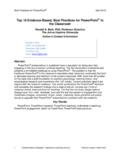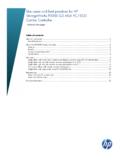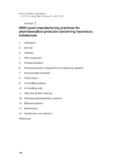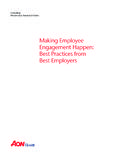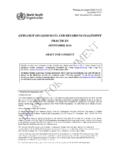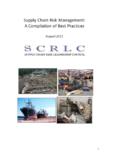Transcription of RECOMMENDATION FOR Law Firm Timekeeping …
1 RECOMMENDATION FOR. Law Firm Timekeeping best practices How to Reduce the Pain of Timekeeping , Improve Accuracy and Increase Billable Hours By Todd Gerstein, CEO Smart WebParts LLC. Smart WebParts RECOMMENDATION for Law Firm Timekeeping best practices How to Reduce the Pain of Timekeeping , Improve Accuracy and Increase Billable Hours By Todd Gerstein, CEO of Smart WebParts LLC. Introduction Despite decades of research, countless solutions and the majority of managing partners hewing to (and preaching) the conventional wisdom, Timekeeping continues to be a source of great pain to attorneys, and often a source of lost revenue to the firm.
2 This paper is our RECOMMENDATION for law firm Timekeeping best practices . It is based upon three decades of experience of working with AMLAW 100 and 200 firms on financial and technology issues, as well as from the insights we have gleaned from the Adam Smith Esq. & Smart WebParts Survey on Law Firm Timekeeping (Survey), which was completed in 2010. The objectives of best practice Timekeeping are to: Make Timekeeping less time consuming Improve the accuracy of the entry Ensure all hours are booked Adhere to ABA standards Time Entry Components Every Timekeeping transaction should include: (1) the date the work was performed, (2) the attorney or staff person performing the work, (3) the time spent on the activity, and (4) the detailed time description.
3 Additional fields may be needed for the time entry. The client may require additional fields such as phase, task and activity codes for billing purposes, and the firm may require fields such as location codes for business purposes. Billing Increments and Rounding: Experienced consumers of legal services generally require that time be billed in increments of one-tenth (.10) hour. This means that time billed for a task should be rounded up to the nearest .10 hour, and that .10 hour will be billed for tasks that take less than 6 minutes. The 2.
4 Use of minimum billing increments greater than .10 hour ( , .25 hour) has been criticized as a practice that can lead to inflated hours. Time Descriptions: Time descriptions should be sufficiently detailed to enable the recipient to identify the specific activity performed, the time spent on the activity and its purpose and relationship to the matter. Vague descriptions such as "receipt and review," "research," "strategy," "conference" and "trial preparation" are non-descriptive and should be avoided. The following examples demonstrate what a preferred description would look like for each of these categories.
5 Entries for review should identify the specific item(s) reviewed and the purpose of the review ( , "Review plaintiff's medical records from Pacific Medical Center in preparation for deposition of Dr. Green"). Entries for research should identify the particular issue(s) researched and the purpose of the research ( , "Research regarding statute of limitations on cause of action for breach of warranty in connection with preparation of motion for summary judgment"). Entries for conferences should identify the participants in and the subject matter of the conference ( , "Telephone conference with plaintiff's attorney Carol Brown re settlement demand").
6 Entries for the drafting or review of correspondence should identify the recipient or sender and the subject matter of the correspondence ( , "Review correspondence from Robert White, HR Director, re termination meeting "). Entries for trial preparation should identify the specific activities performed ( , "Prepare outline for cross-examination of plaintiff in preparation for trial set for February 11, 2012"). Avoid Block Time Entries Block time entries list a group of tasks in a block summary under a single time charge, rather than showing a description of each task and the actual time associated with it individually.
7 For example, a timekeeper may list all of the tasks performed on a matter in a particular day in one time entry ( , "Draft settlement terms, conference with plaintiff's attorney re settlement, telephone call to Sally Green re status: hours"). The use of block billing obscures the actual time spent on each task contained within such an entry. Block billing is a practice frowned upon by experienced consumers of legal services. Each task performed and the time associated with it should be entered as a separate transaction. 3. Book Non-Billable Time If a law firm wants its lawyers to invest non-billable time in activities like marketing, business development, recruiting and firm administration, ways must be found to measure the effort.
8 Non- billable matters should be set up for every category a firm wants to measure. Time Expended for Hourly Bills According to the American Bar Association Formal Opinion 93-379 Billing for Professional Fees, Disbursements and Other Expenses: It goes without saying that a lawyer who has undertaken to bill on an hourly basis is never justified in charging a client for hours not actually expended. If a lawyer has agreed to charge the client on this basis and it turns out that the lawyer is particularly efficient in accomplishing a given result, it nonetheless will not be permissible to charge the client for more hours than were actually expended on the matter.
9 When that basis for billing the client has been agreed to, the economies associated with the result must inure to the benefit of the client, not give rise to an opportunity to bill a client phantom hours. This is not to say that the lawyer who agreed to hourly compensation because of a particularly efficient or outstanding result, or because the lawyer was able to reuse prior work product on the client's behalf. The point here is that fee enhancements cannot be accomplished simply by presenting the client with a statement reflecting more billable hours than were actually expended.
10 The ABA Committee on Ethics and Professional Responsibility has decided to address several practices that are the subject of frequent inquiry: The first set of practices involves billing more than one client for the same hours spent. In one illustrative situation, a lawyer finds it possible to schedule court appearances for three clients on the same day. He spends a total of four hours at the courthouse, the amount of time he would have spent on behalf of each client had it not been for the fortuitous circumstance that all three cases were scheduled on the same day.
